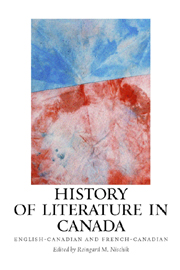Book contents
- Frontmatter
- Contents
- Acknowledgments
- Introduction: Writing a History of Literature in Canada
- I Beginnings
- II The Literature of New France, 1604–1760
- 3 Historical Background
- 4 Literature on New France
- 5 Colonial Literature in New France
- III The Literature of British Canada, 1763–1867
- IV From the Dominion to the Territorial Completion of the Nation, 1867–1918
- V The Modern Period, 1918–1967
- VI Literature from 1967 to the Present
- Further Reading
- Notes on the Contributors
- Index
5 - Colonial Literature in New France
from II - The Literature of New France, 1604–1760
Published online by Cambridge University Press: 12 September 2012
- Frontmatter
- Contents
- Acknowledgments
- Introduction: Writing a History of Literature in Canada
- I Beginnings
- II The Literature of New France, 1604–1760
- 3 Historical Background
- 4 Literature on New France
- 5 Colonial Literature in New France
- III The Literature of British Canada, 1763–1867
- IV From the Dominion to the Territorial Completion of the Nation, 1867–1918
- V The Modern Period, 1918–1967
- VI Literature from 1967 to the Present
- Further Reading
- Notes on the Contributors
- Index
Summary
DESPITE THE VAST BODY OF LITERATURE about New France produced by French writers, it must be noted that before 1760 there was no literary scene in New France that could have rivaled that of France — neither in quality nor by extent. The French colony, conquered by military force in 1760 and ceded to Great Britain in the Treaty of Paris in 1763, was a colony in the strict sense — that is, a society still far from capable of taking charge of its own destiny. On the other hand, if Quebec today is a nation with a culture of its own, it is because by 1760 New France had already developed a French culture distinct from that of France, a culture that managed to resist the powerful temptations to assimilate with the dominant culture of Britain and English Canada. Yet in 1760 New France did not have a literature of its own, and this fact describes the situation for both the works from France that it incorporated and the literary works it produced — or can be assumed to have produced from today's perspective (the majority of texts were not preserved, since they were largely written for special occasions and were not accorded any greater importance).
The matter of a colonial literature in New France arises somewhat more plausibly with the establishment of the first trading settlements in Acadia in the early seventeenth century.
- Type
- Chapter
- Information
- History of Literature in CanadaEnglish-Canadian and French-Canadian, pp. 58 - 66Publisher: Boydell & BrewerPrint publication year: 2008



